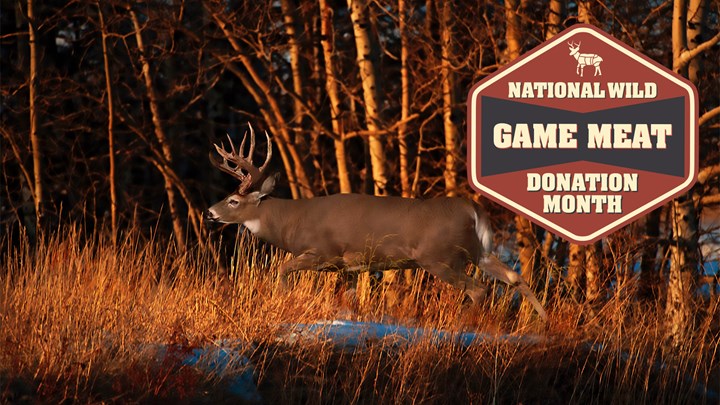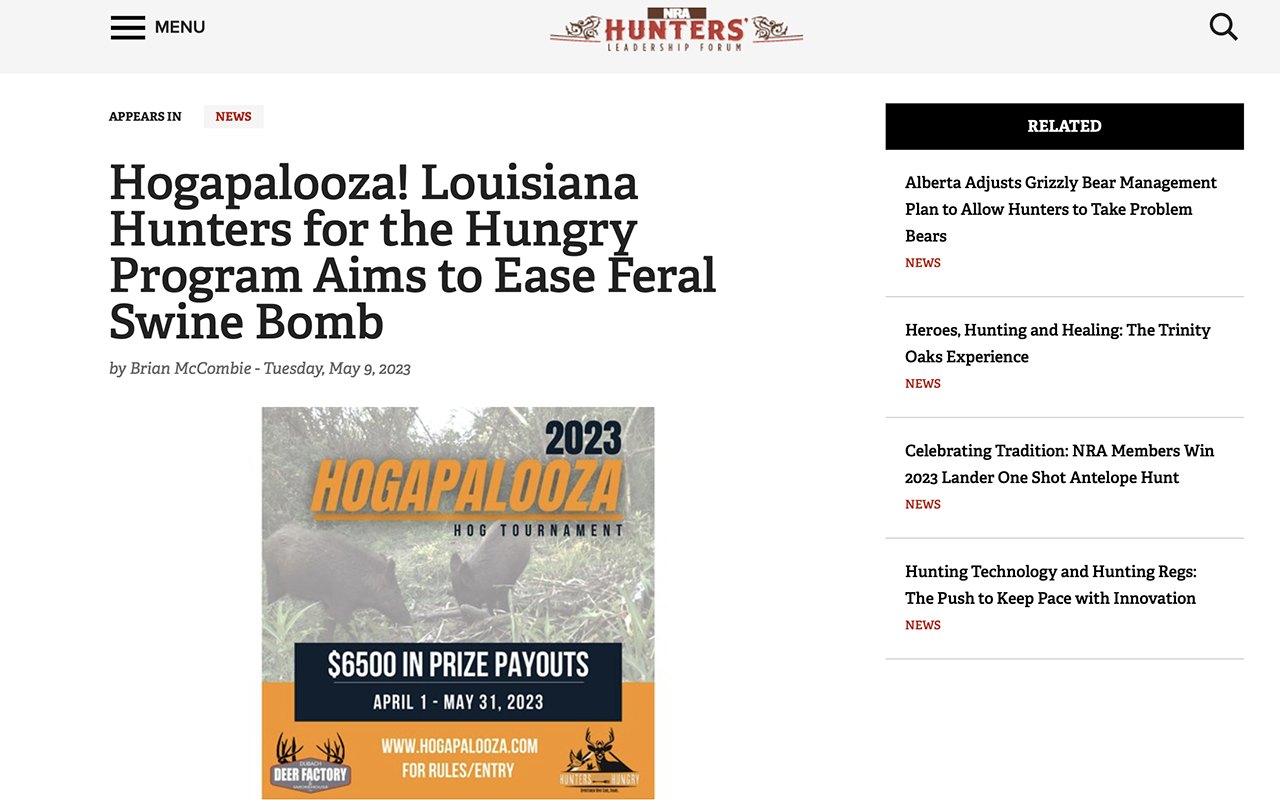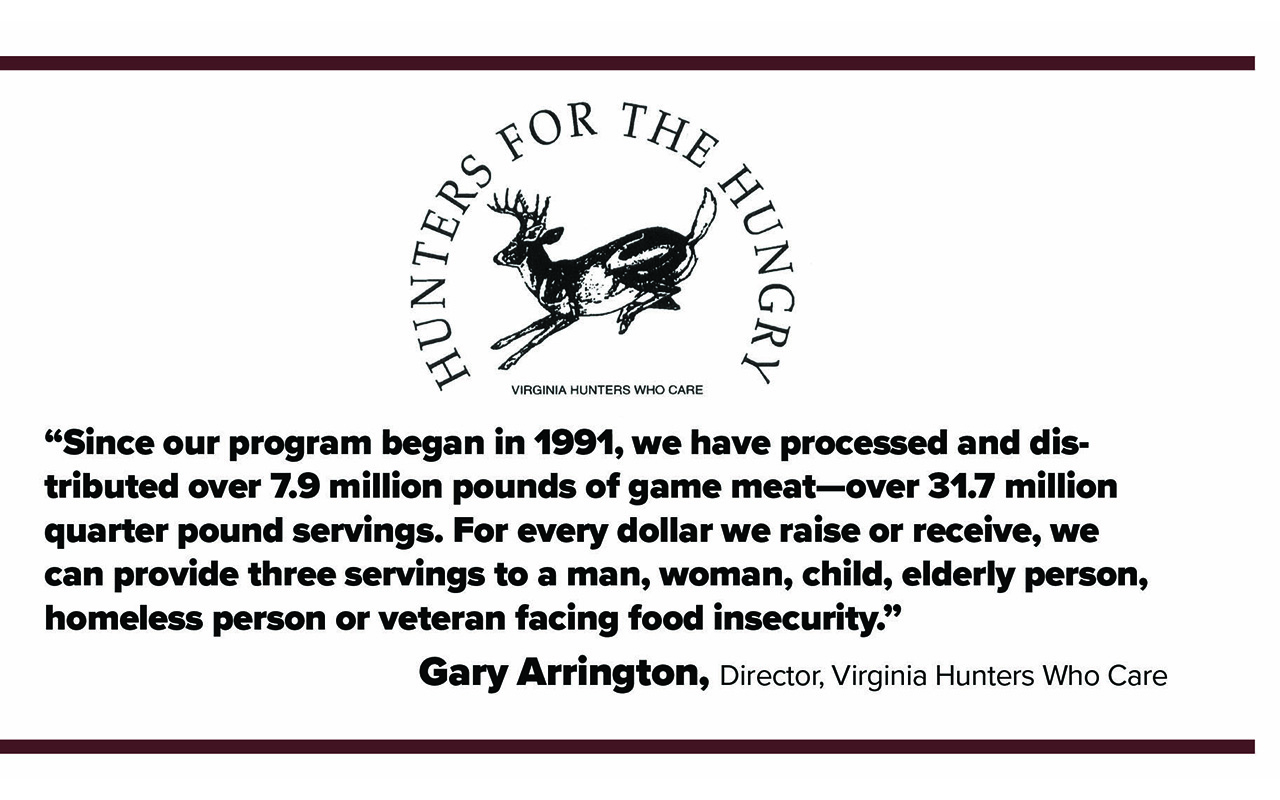
by Karen Mehall Phillips - Friday, November 1, 2024

“Alone, we can do so little; together, we can do so much.”—Helen Keller
The NRA is celebrating the heart of the hunter this month as it marks America’s second consecutive National Wild Game Meat Donation Month (NWGMD) to recognize the hunters across America who donate millions of pounds of nutritious game meat to their local Hunters for the Hungry (HFH) programs each year. Last year’s inaugural celebration drew support from hunter-backed groups and Wyoming Gov. Mark Gordon, who declared November Game Meat Donation Month in the Cowboy State. As news of this worthy initiative spreads, the NRA is pleased to announce that nine U.S. governors are joining the NRA in observing NGMDM 2024.

Standing with the NRA to champion hunters and encourage us all to share our surplus venison and other game meat, the following nine governors are signing Game Meat Donation Month proclamations in November: Louisiana Gov. Jeff Landry; Mississippi Gov. Tate Reeves; Nebraska Gov. Jim Pillen; North Dakota Gov. Doug Burgum; South Dakota Gov. Kristi Noem; Texas Gov. Greg Abbott; Virginia Gov. Glenn Youngkin; West Virginia Gov. Jim Justice; and Wyoming Gov. Mark Gordon.
Regardless of their state’s HFH program name—Hunters for the Hungry, Hunters Helping the Hungry, Farmers and Hunters Feeding the Hungry, Hunters Against Hunger, Sportsmen Against Hunger, Hunters Who Care, Hunters Sharing the Harvest and others—all are united over a common goal: to provide a vital source of nutritious wild game meat for those living in hunger. Attesting to the urgency of hunters’ cause, Feeding America, the nation’s largest hunger relief organization, reports that hunger is a reality for one in seven Americans.
The governors’ proclamations applaud hunters for donating their surplus game meat and encourage us all to do the same as we prepare to celebrate Thanksgiving and the season of giving. With hunting now enshrined in 23 state constitutions, thanks in large part to the work of NRA-ILA, the proclamations underscore how legal, regulated hunting offers opportunities to connect with nature while providing food security and nutrition to hunters and those less fortunate. They highlight the number of residents who struggle with food insecurity in their states, an issue exacerbated by rising food costs, and reference recent NRA Hunters’ Leadership Forum (HLF) research, which shows that while American hunters share 119 million pounds of harvested game meat with people outside their households each year, many meat processors in 2022 said they did not receive enough game meat to fulfill their missions—while others had to turn away some of the donated deer due to limited resources.
In showcasing hunters’ ongoing contributions to conservation, the proclamations also remind the public that state wildlife agencies are funded largely by hunters. In fact, the U.S. Fish and Wildlife Service announced that $989,531,728 in Federal Aid in Wildlife Restoration Act funding (commonly known as the Pittman-Robertson Act) went back to the states in 2024 alone for their wildlife and habitat conservation programs, thanks to the “user pays, public benefits” system known as the North American Model of Wildlife Conservation (NAMWC). Showcasing hunters’ tradition of sharing their wild game harvests takes on even greater significance as we strive to protect hunting’s future and increase its cultural acceptance while promoting it as a food source, a right and a vital wildlife management tool.
For background, hunters began mobilizing in the early 1990s to make a difference where they hunt and where they live, presenting HFH as a common-sense solution to addressing hunger by tapping into hunting’s role as an integral cultural component of American communities. With many hunters able to harvest more than they can eat or share with friends and family, hunters, meat processors, meat inspectors and hunger relief organizations began spearheading cooperative efforts to accept hunters’ generous game meat donations for processing and distribution to needy families. During this time, the NRA launched its HFH Clearinghouse to put interested individuals in touch with local programs while assisting with public awareness and fundraising. Thirty-plus years later, the NRA continues to highlight these groups and has donated nearly $700,000 to support their efforts.
While there are more than 40 unique HFH programs nationwide that have provided 40-plus-million pounds of wild game meat to needy families, homeless shelters, soup kitchens and food banks, they operate with limited funding. To help ensure these programs do not fall victim to their own success, the NRA provides an HFH Subsidy Program with considerable grant money donated by the NRA Hunters’ Leadership Forum (HLF). Provided in amounts up to $2,000 each year, funds are used to help HFH processors cover the processing, shipping and distribution of donated game meat. As reported by NRA Media, the NRA HLF allocated $100,000 in grants in 2023 alone.
In addition, the NRA HLF donated $70,000 to the East Texas Food Bank for the purpose of building a custom refrigerated trailer to store and transport donated meat to participating HFH processors. It also recently donated $30,000 to the Food Bank for Central & Northeast Missouri to process venison snack sticks for the organization’s “Buddy Packs” that it distributes to needy school children.
Ongoing HFH program support is also provided by NRA Media, which regularly highlights the accomplishments of state HFH groups such as: Louisiana’s inaugural “Hogapalooza” event that helped to reduce feral hog numbers while providing much needed protein to local food banks; the efforts of Wyoming First Lady Jennie Gordon and the hunter-backed Food from the Field program launched in cooperation with the Wyoming Game and Fish Department (WGFD); and HFH groups’ annual fundraising efforts.

As a longtime NRA employee and Endowment member, I have felt privileged to support the NRA’s HFH efforts through numerous HFH public relations efforts from day one, including organizing and accompanying the late David Horne, founder of the then-fledgling Virginia Hunters Who Care, located a few hours from NRA headquarters, on statewide media tours in the 1990s; supporting NRA-ILA Executive Director Randy Kozuch and other NRA leaders on state-based HFH fundraising galas with U.S. governors; and volunteering alongside other NRA staff at soup kitchens where we were struck by how pantries were full of donated canned vegetables while the freezers were short on processed meat, which was more expensive and tougher to store.
For an example of how deeply NRA employees care about the HFH mission, Marc Peugeot, an NRA employee from Ohio, helped to relaunch a game meat donation program in his community in 2022. He found three local processors who agreed to take deer for processing and applied for and received an NRA grant to help cover program costs.

We must share with nonhunters how taking a surplus deer to donate also supports state wildlife agencies and keeps deer populations within carrying capacity. Hunting also helps to decrease the number of deer-vehicle collisions as shared in a recent joint study by the Indiana Department of Natural Resources and Purdue University that confirmed what many hunters have said for years: Targeted hunting, increased bag limits and lengthened hunting seasons near high-risk roadways can save lives while reducing accidents (in the study’s case by 20%) and property damage costs and generating more money for state wildlife agencies to funnel into their conservation programs.
So, when it comes to celebrating National Wild Game Meat Donation Month, maybe the question should be: Why didn’t we do it sooner? One does not have to be a hunter to appreciate hunters’ profound impact as they aid those less fortunate not just in November but all year round.
We NRA members and hunters appreciate the governors and the many like-minded organizations, state-based HFH groups and outdoor media outlets who are supporting National Wild Game Meat Donation Month, including through featuring promotional banners on their websites generating awareness of the initiative and underscoring the extent to which hunters care. Please consider donating a surplus deer or making a financial contribution to support an HFH program in your community. Invite a nonhunting friend over for a healthy venison dinner and explain the benefits of hunters and hunting firsthand. And, as we count our blessings this Thanksgiving, let us give thanks for the generosity of hunters, who continue to bless those less fortunate, embody the spirit of giving and illustrate the inherent connection between our actions and the world around us.
To get involved in a HFH group in your area, please visit https://hfth.nra.org. To access NRA Media graphics to help you or your local Hunters for the Hungry organization promote National Wild Game Meat Donation Month, please click here.
E-mail your comments/questions about this site to:
[email protected]
Proudly supported by The NRA Foundation and Friends of NRA fundraising.
